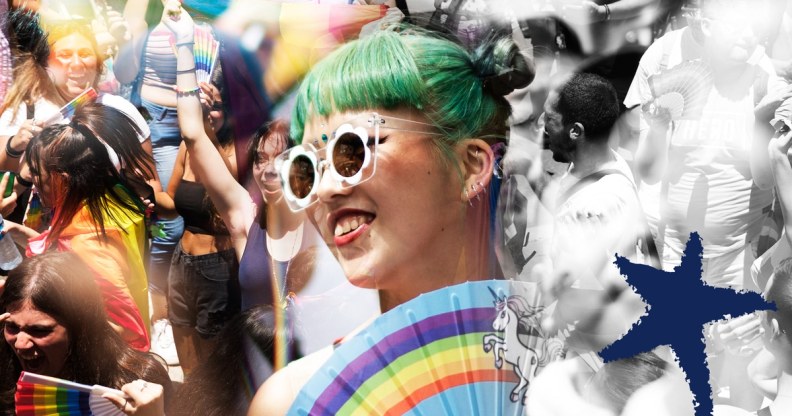Younger Brits more queer than ever before, eye-opening Stonewall study finds

Credit: Getty / Stonewall
Britain is becoming a “Rainbow Nation”, according to a new report from Stonewall, with two in five of Generation Z having attractions that are queer.
The report’s findings have shown younger people are more likely to identify as queer and prefer to do without traditional labels of sexual orientation.
Among Gen Z (16-26-year-olds), 71 per cent of people surveyed identified as straight – compared to 91 per cent of Baby Boomers (56-75).
The study, of 2,000 people across the UK, also found that 40 per cent of Gen Z showed a “pattern of attraction” that can be described as queer.
This stat hints at a growing “Rainbow Nation” that is being led by the younger generations.
The percentage of people who identify as gay remains similar across the generations, but 3 per cent of Generation Z were found to identify as lesbian – compared to less than 1 per cent of Baby Boomers and Generation X (43-56).
Only 2 per cent of Baby Boomers surveyed identified as bi, compared to 14 per cent of Gen Z.
The survey noted the increase in people identifying as something other than straight could be a result of a society less hostile to LGBTQ+ people. This comes despite a growing number of anti-LGBTQ+ crimes in the UK.
Looking beyond labels
The study also produced results which appear to show people are more inclined to shun traditional labels of sexuality.
Of the people surveyed, 66 per cent of people said they were exclusively attracted to the opposite sex. However, 84 per cent said they were straight when asked to identify their label.
When it came to bi or pansexual labels, 7 per cent placed themselves under those categories, but 19 per cent aligned themselves with bi or pan orientations, when the label was removed.
‘Diverse, inter-connected communities’
The report also found 1 per cent of people surveyed identified as a trans woman, trans man, non-binary or genderqueer/gender fluid.
Two in five people surveyed (39 per cent) said they have a personal friend or family member who is lesbian or gay, 22 per cent said they have one who is bi, and nine per cent have one who is trans.
Nancy Kelley, CEO of Stonewall describes the results of the report as “amazing to see that younger generations are no longer afraid to be themselves and have supportive families and social environments to thrive.”
She also tackled the attacks on queer lives seen in the mainstream and on social media in recent years.
“This profound sea-change in our identity and orientation indicates that the idea of a ‘culture war’ often referenced in parts of the media is a misnomer being propagated by a narrow section of society, out of touch with – and unwilling to accept – the reality of our diverse, inter-connected communities.”
School support ‘vital’ for queer youth
Chief executive of LGBT+ young people’s charity Just Like Us, Dominic Arnall, told PinkNews it’s “Wonderful more and more young people are coming out as bisexual”.
He said this report makes it “vital” that people LGBTQ+ people are supported in school, with high numbers of young people identifying as queer.
“LGBT+ school pupils are still twice as likely to be bullied, struggle with mental health and face daily tension at home.
“Only half of school pupils are getting positive messaging about being LGBT+ in school even though it is linked to lowering suicidal thoughts and depression among pupils – whether they’re LGBT+ or not.”
The report also highlights how far social acceptance has come from a time when homosexuality was a criminal offence, with next year marking the 20th anniversary of Section 28 being abolished in England and Wales.
Recently, LGBTQ+ activists feared the Tories would try to “cement their power” with a new version of Section 28. It followed MP Nadhim Zahawi promising to “protect” children from “radical activists”.
Data used in the report is based on three surveys which individually interviewed more than 2,000 Britons aged 16 to 75 in the summer of this year.
In Stonewall’s survey, Generation Z are defined as 16 to 26, Millennials as 27 to 42, Generation X as 43 to 56 and Baby Boomers as 56 to 75.

